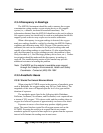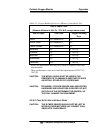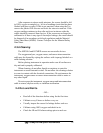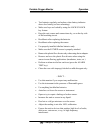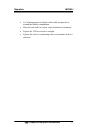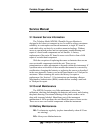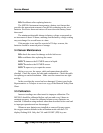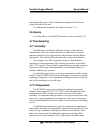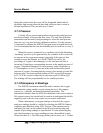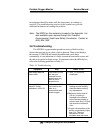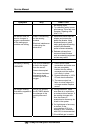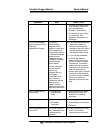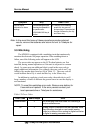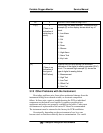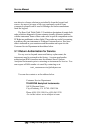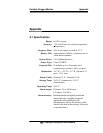
Service Manual MX300-I
Teledyne Analytical Instruments 36
during this period since this error will be eliminated when both the
thermistor and sensing electrode have had sufficient time to come to
thermal equilibrium. This can take up to 2 hours.
3.7.3 Pressure
Virtually all gas sensors and monitors measure the partial pressure,
not the percentage, of the gas that they sense. The only time that these
instruments can accurately read percentages is when the total pressure
does not vary over time between calibrations and use. For this reason it
is important to calibrate the MX300-I oxygen sensor at regular intervals.
It is recommended that the unit be calibrated prior to each use or every 8
hours.
When the sensor is connected to a ventilator circuit, the alternating
“breathing” pressure cycles generated by the ventilator will be sensed as
an increase in the oxygen percentage (especially if the sensor is fast
enough to sense the changes, as is the R17MED). In reality, the
percentage of oxygen is not changing; it is the total pressure that is
increasing. Producing a corresponding increase in the partial pressure of
oxygen. A hundred centimeter of water pressure pulse will produce a
0.11 atmosphere, or an 11% increase in the total and therefore partial
pressure of oxygen. Assuming that the sensor is fast enough to track this
pressure pulse, an un-pressurized reading of 50% oxygen will increase
to 55.3% if the sensor is subjected to a pressure cycle of 100cm H
2
O.
The reading will rise proportionally less for smaller pressures.
3.7.4 Discrepancy in Readings
The MX300-I instrument should be used to measure the oxygen
concentration exiting another oxygen mixing device or life support
system (i.e., a blender, incubator or anesthesia machine). The
information obtained from the MX300-I should never be used to adjust a
life-support system, but should only be used as an indication that the life
support system or device may require service and/or calibration.
When a discrepancy in oxygen readings is detected, the oxygen
analyzers readings should be verified by checking the MX300-I battery
condition and calibration using 100% Oxygen. If the monitor can be
calibrated, the unit can be assumed to be in good working order and
capable of providing readings to specification. If, after reinstalling the
unit, the discrepancy in oxygen readings persists, the problem is most
likely elsewhere (i.e., flow blockage, primary device error, etc.). Further



